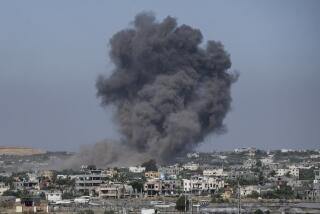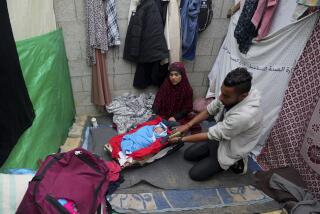Opposition Advances on Key City
- Share via
TERMEZ, Uzbekistan — Afghanistan’s opposition forces--some charging Taliban tanks on horseback--pressed their offensive on strategic Mazar-i-Sharif on Wednesday, capturing a key hilltop and moving their southern front to within 10 miles of the northern city.
“I hope we will take the city in four to five days,” said Haji Mohammed Muqiq, interior minister for the anti-Taliban Northern Alliance. “This is war. We can’t be certain if we will take the city. But that is our desire.”
In Washington, Marine Gen. Peter Pace, vice chairman of the Joint Chiefs of Staff, also told reporters Wednesday that the Northern Alliance was “making gains” but said he couldn’t be more specific.
“We do know the opposition forces are making progress,” Pace said. “This is opposition forces riding horseback into combat against tanks and armored personnel carriers. So these folks are aggressive. They’re taking the war to their enemy and ours. We are supporting them as best we can.”
At the White House on Wednesday, President Bush and British Prime Minister Tony Blair used forceful language to fight the notion that the anti-terror campaign isn’t going as well as expected. At a joint news conference, Bush said: “We both recognize that we wage a fight to save civilization and that we must prevail--and not only must prevail, will prevail.”
Bush said he believes that progress is being made--despite the absence of “one of these ‘Kodak moments.’ There’s no ‘moment’ to this; this is a long struggle and a different kind of war.
“We know that slowly but surely the Taliban is crumbling. Its defenses are crumbling. Its folks are defecting,” Bush said, although he offered no proof.
Blair said international support for the campaign is undiminished.
“I believe . . . that the determination to see that justice is done is every bit as strong today as it was on September the 11th,” Blair said.
“The cause is just, the strategy is there, the determination is there, and there is a complete and total commitment to making sure that this is a battle in which we will prevail,” he added.
In Afghanistan, opposition commanders--who have been using U.S. special operations troops to help target airstrikes against the Afghan regime--said they had called off airstrikes during their advance on Mazar-i-Sharif, with only a few bombs dropped on the hilltop village of Cheshme Shafta, just 10 miles south of the city.
“This is a very important village because you can see the whole city from there,” Muqiq said by satellite telephone from the town of Shulgarah, about 15 miles farther south, which he said was also seized Wednesday. “An important front has been opened.”
Kuodratullo, an aide to Northern Alliance commander Ata Mohammed, said that alliance forces, which had been more than 30 miles from Mazar-i-Sharif’s outskirts, advanced into Shulgarah by midday and that some pressed on to Cheshme Shafta. He claimed that 100 Taliban soldiers had been killed and 100 captured and then released; his count could not be verified.
“They were released because they were local Taliban. This shows that we are humanitarian people,” said Kuodratullo, who uses one name. He also spoke by satellite telephone from the region. In addition, he added, three Taliban commanders had defected to the Northern Alliance, along with 300 fighters.
Seizing Mazar-i-Sharif, which was captured by the Taliban in 1998, could open important northern supply lines for anti-Taliban forces and humanitarian groups, and isolate fighters of the fundamentalist Islamic regime. The city also has two airfields that could be used for U.S. military operations.
The International Committee of the Red Cross estimates that about 280,000 refugees from elsewhere in Afghanistan are living in open fields around Mazar-i-Sharif. In addition, Red Cross officials said, a severe drought, coupled with the disruption of war, threatens rural villagers in northern Afghanistan with malnutrition and starvation.
Victories around Mazar-i-Sharif would put the alliance in good position to resume the ground offensive in the spring, after operations slowed by the extreme winter weather in northern Afghanistan get back up to speed.
More important, by suggesting that the U.S.-backed side has momentum, the anti-Taliban forces may encourage members of other ethnic groups in Afghanistan to join their cause.
Asked at the Pentagon briefing whether the Northern Alliance forces were actually gaining ground in their battle to take the city, Pace demurred.
“I wouldn’t characterize it in that way,” Pace said. “What I would say is that for about the last week or so, we have been able to concentrate a great deal more of our aviation in support of the opposition forces. And because of that, we have been able to assist them more in their ground campaign.”
Of the 80 bombing runs flown by U.S. warplanes Tuesday, the most recent day for which figures were available, two-thirds were designed to support anti-Taliban forces, Pace said. The remainder were directed against cave and tunnel complexes where the Taliban and Osama bin Landen’s Al Qaeda terrorist network are believed to hide men and store equipment and ammunition.
Meanwhile, the Pentagon tried to squelch speculation that Defense Secretary Donald H. Rumsfeld might sideline the commander of the campaign, Army Gen. Tommy Franks.
“Gen. Franks is not going anywhere,” Pentagon spokeswoman Victoria Clarke said. “The secretary has the greatest confidence in Gen. Franks and his leadership at Central Command.”
Also Wednesday, Rumsfeld held a closed-door briefing for members of Congress to outline the military’s accomplishments in recent weeks.
“It was a report that showed progress and outlined some of the problems that we know we’re going to have in the future,” said Rep. Henry A. Waxman (D-Los Angeles). “He certainly didn’t make a plea for patience, but he reminded us all that this war is going to take some time.”
Rumsfeld was greeted very warmly, Waxman said.
“The overwhelming view of members of both sides of the aisle was very favorable to his leadership and the work being done by our armed forces,” Waxman said. “Many members prefaced their questions by expressing to him our gratitude.”
*
Reynolds reported from Termez and Schrader from Washington. Times staff writers Greg Miller and Edwin Chen in Washington contributed to this report.
More to Read
Sign up for Essential California
The most important California stories and recommendations in your inbox every morning.
You may occasionally receive promotional content from the Los Angeles Times.













